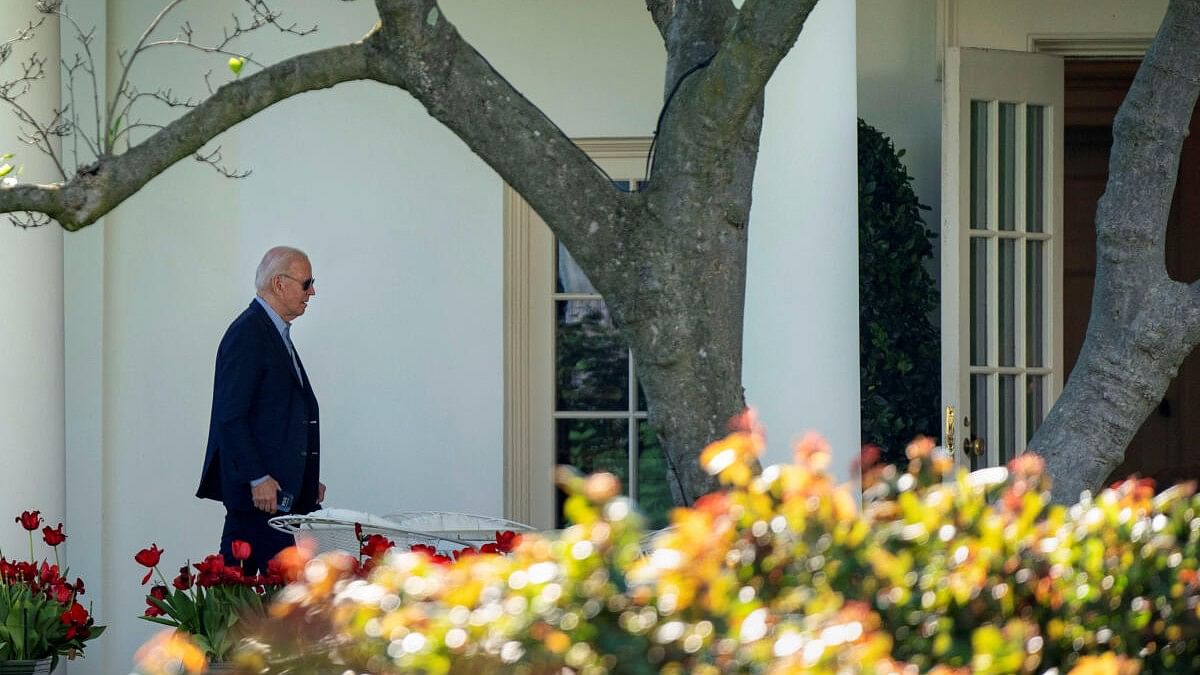
U.S. President Joe Biden walks to the Oval Office at the White House in Washington, U.S., April 13, 2024. The president returned to the White House from Wilmington, Delaware to consult with his national security team after Iran said it launched dozens of attack drones at Israel earlier this afternoon.
Credit: Reuters Photo
By Andreas Kluth
Press conferences can be cringey anywhere, but Monday’s briefing at the US State Department was in a class of its own. For 50 tortured minutes, Matt Miller, the spokesperson, struggled valiantly but haplessly, not so much against the journalists in the room as against the cumulative force of the contradictions in President Joe Biden’s foreign policy.
The main non sequitur at issue concerned Biden’s dual message to Israel following this weekend’s massive barrage of drones and missiles from Iran. Part I says that American support for Israel is, and will forever remain, “ironclad.” Part II qualifies that the US is determined to “prevent escalation,” meaning a wider regional or even global war. That second aspect requires leaning on Israel to show restraint in its retaliation. But which of the two parts has priority?
If US support for Israel is indeed ironclad, in effect meaning unconditional, then Biden has hitched American grand strategy to Israel’s response in the coming days and weeks. Say, for example, that Israeli Prime Minister Benjamin “Bibi” Netanyahu and his far-right coalition partners rain shock and awe on the Iranian homeland or even bomb Iran’s nuclear facilities. The mullahs in Tehran and their surrogate militias throughout the Middle East will then feel they must attack Israel with all they’ve got, lest they look weak. Once that happens, the US, having pledged to defend Israel, would be at war with Iran, even as Russia and China will probably line up behind Tehran.
Alternatively, Biden could make his support conditional: Yes, the US has Israel’s back, but only as long as Bibi’s government isn’t the one escalating further. (Israel arguably triggered this tit-for-tat cycle by striking Iran’s diplomatic compound in Syria on April 1.) But then Biden couldn’t describe the American commitment as “ironclad” anymore.
It usually falls to people like Secretary of State Antony Blinken to square this circle, or to Matt Miller in that press briefing. And how Miller suffered. He used the word “ironclad” twice by my count, but also substituted “sacrosanct” and other adjectives. And in the same breath, as either prefix or suffix, he added variants of “de-escalation” or its verb form 19 times.
Still unable to resolve the contradiction, Miller seemed to exasperate the assembled journalists and himself. “I don’t know how many times you’ve heard me say it,” he pleaded at one point. “And of course, if you’ve heard us say it, you can imagine how many times our counterparts across the region and across the world have heard us say it.” When even that insight didn’t settle the matter, he almost got himself into an even bigger mess, elaborating that “publicly, of course, we are committed to the defense of Israel.” And privately? He can’t comment on private conversations, Miller deflected.
The briefing thus coughed up an entire hairball of contradictions. Biden has affirmed and reaffirmed his support for Israel since Hamas sadistically attacked the Zionist state on Oct. 7. But he’s also cajoled, coaxed and all but commanded Bibi to show restraint in bombing the Gaza Strip and to facilitate more humanitarian aid — so far with limited success. The death toll in Gaza having passed 30,000, would Biden’s pledge of support still hold at 50,000, or 100,000?
There’s also the paradox of the conflict in the Middle East compared with Ukraine’s war of self-defense against Russia. Ukraine has been the victim of drone and missile attacks from Russia for more than two years; many of the drones are the same type that targeted Israel, made in Iran. The “‘shaheds’ in the skies above Ukraine sound identical to those of the Middle East,” Ukrainian President Volodymyr Zelenskiy observed ruefully this week. “European skies could have received the same level of protection long ago if Ukraine had received similar full support from its partners in intercepting drones and missiles.”
Another asymmetry: Biden has so far tolerated Israel when it crosses his “red lines,” and he keeps supplying weapons without conditions. But he dictates that Ukraine never use American arms to strike targets inside Russia proper, and withholds some types of ordnance just to make sure. One answer, of course, is that Biden fears escalation in the conflict between Russia and the West even more, because Putin has nukes and wantonly threatens to use them, whereas Iran doesn’t have nukes (yet) while Israel does. Still, it’s getting harder to make all this sound coherent.
Contradictions are a fact of life and even the mark of a sophisticated mind open to the world’s bewildering complexity. “Do I contradict myself?,” the poet philosopher Walt Whitman asked rhetorically. “Very well then I contradict myself. (I am large, I contain multitudes.)”
That dictum also applies generally to international relations. The US has many allies, from NATO to the emerging minilateral pacts in the Indo-Pacific. A tension common to these alliances is that the US must pledge unqualified support to deter (Moscow in the first case, Beijing in the second), but simultaneously minimize the “moral hazard” of any one ally provoking the war that isn’t supposed to happen.
What makes 2024 a historic year is that world events in different places — eastern Europe, the Middle East and possibly even Asia — are conspiring to expose these contradictions of US foreign policy, and making them increasingly untenable. This week it was Matt Miller bearing the brunt; come November, it may be Biden. And all the while, world peace is being held hostage.